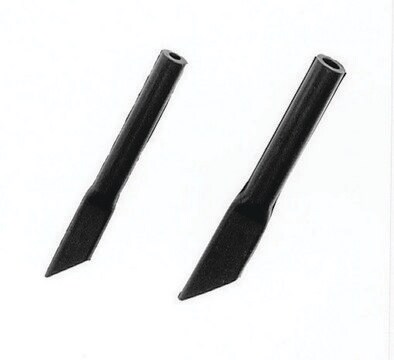1.16092
Blachy aluminiowe HPTLC, celuloza
pkg of 25 sheets, sheet L × W 20 cm × 20 cm, aluminum support
Zaloguj sięWyświetlanie cen organizacyjnych i kontraktowych
About This Item
Kod UNSPSC:
41115711
NACRES:
NB.21
Polecane produkty
Materiały
aluminum support
cellulose matrix
Poziom jakości
Właściwości
binder Organic Polymer
fluorescent indicator: no
opakowanie
pkg of 25 sheets
metody
thin layer chromatography (TLC): suitable
grubość warstwy
70-110 μm
płytka dł. × szer.
20 cm × 20 cm
arkusz dł. × szer.
20 cm × 20 cm
temp. przechowywania
2-30°C
Opis ogólny
25 Aluminium sheets 20 x 20 cm
Cellulose plates are used to analyze polar substances. An organic sorbent, cellulose is perfect for separating hydrophilic substances by partition chromatography. Typical applications include the analysis of amino acids, carbohydrates, and phosphates as well as nucleic acid and nucleic acid derivatives. We offer cellulose plates in two grades: TLC for conventional and HPTLC for demanding, high-performance separations.
Powiązanie
Replaces: 16092-1; 16092
Komentarz do analizy
Layer thickness: 70 - 110 µm
Deviation of layer thickness per plate: ≤ 30 µm
Aminoacid test
hRf-values
- L-serine, amino acid test:
20 - 30
- L-threonine, amino acid test: 30 - 40
- L-alanine, amino acid test: 35 - 45
- L-methionine, amino acid test: 55 - 65
- L-phenylalanine, amino acid test: 60 - 70
- L-leucine, amino acid test: 70 - 80
Typical value determined on a sheet
Eluent: 1-Butanol/ acetone/ acetic acid/ water (35/35/7/23 v/v/v/v) twice developed
Deviation of layer thickness per plate: ≤ 30 µm
Aminoacid test
hRf-values
- L-serine, amino acid test:
20 - 30
- L-threonine, amino acid test: 30 - 40
- L-alanine, amino acid test: 35 - 45
- L-methionine, amino acid test: 55 - 65
- L-phenylalanine, amino acid test: 60 - 70
- L-leucine, amino acid test: 70 - 80
Typical value determined on a sheet
Eluent: 1-Butanol/ acetone/ acetic acid/ water (35/35/7/23 v/v/v/v) twice developed
Ta strona może zawierać tekst przetłumaczony maszynowo.
produkt powiązany
Numer produktu
Opis
Cennik
Certyfikaty analizy (CoA)
Poszukaj Certyfikaty analizy (CoA), wpisując numer partii/serii produktów. Numery serii i partii można znaleźć na etykiecie produktu po słowach „seria” lub „partia”.
Masz już ten produkt?
Dokumenty związane z niedawno zakupionymi produktami zostały zamieszczone w Bibliotece dokumentów.
Nasz zespół naukowców ma doświadczenie we wszystkich obszarach badań, w tym w naukach przyrodniczych, materiałoznawstwie, syntezie chemicznej, chromatografii, analityce i wielu innych dziedzinach.
Skontaktuj się z zespołem ds. pomocy technicznej






